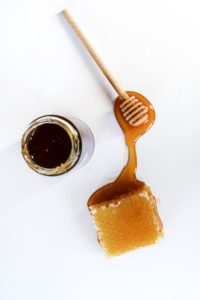May 03, 2019 | Black & Kletz Allergy

The theory behind this hypothesis is rooted in the fact that when bees land on flowering trees and plants, the pollens that are on the flowers stick to the bees’ abdomens. When bees make honey, the pollen that is on their abdomen is incorporated in the honey. Local honey contains the pollen of these flowering trees and plants. Processed honey that you would typically buy at a grocery store is usually micro-filtered and pasteurized. These processes generally remove the pollen from the honey. The thought is that local “raw” honey contains pollens from local trees and plants and by eating the honey, an individual will develop a “resistance” to the pollens that are in the local honey. This would then lead to less or no allergic symptoms when exposed to these local pollens. In theory, this sounds good, but in fact, there are flaws in this concept which are as follows:
The first fault in this idea is that individuals suffering from seasonal allergies in the Spring are allergic to non-flowering trees such as maple, birch, elm, hickory, cedar, ash, beech, and oak trees. They are not generally allergic to the pollen from flowering trees and plants such as cherry trees, Bradford pear trees, redbud trees, dogwood trees, and forsythia bushes. The reason for this is fairly simple. The pollen of flowering trees and plants are heavy in weight and thus are not wind-dispersed. Since the pollen is heavy, through evolution, these types of trees and plants had to develop flowers in order to attract bees so that they could cross-pollinate and thus reproduce. The bees land on a flower and the pollen then sticks on the abdomen of the bees. The bees then fly to another same species flowering tree or plant and when they land on these flowers, the pollen on their abdomen gets distributed on this new flower and hence cross-pollination occurs. The fact that the pollen is heavy and not wind-dispersed means that individuals do not inhale the pollen and therefore do not become sensitized or allergic to these pollens. Unlike flowering trees and plants, the non-flowering tree pollens are light in weight and are wind-dispersed, thus able to cause sensitization and allergy symptoms to allergic-prone individuals. This translates into the fact that eating local honey (which is composed of flowering tree pollens) will not reduce one’s allergies in the Spring because it does not contain the correct types of pollens that cause hay fever.
In addition, the amount of pollen in local honey is not consistent between different bottles of honey from the same beekeeper yet from different beekeepers. It is not standardized. The idea of allergen desensitization (i.e., allergy immunotherapy, allergy hyposensitization) is to give a very low tolerable dose and increase the amount slowly over time, so that an individual can become tolerant to that allergen (e.g., tree pollen).
Another major flaw in this theory is that there have been no good scientific studies showing any advantage in using local honey to treat allergies. There are a few studies that are flawed in the manner the studies were done as well as the number of participants are too small to make a general correlation between consuming local honey and its effects on allergies. The use of honey to treat allergies is also not endorsed by either the American Academy of Allergy, Asthma & Immunology or the American College of Allergy, Asthma & Immunology.
Honey does have some advantages however. It is not uncommonly used to help alleviate coughs and of course, it tastes good! It is also interesting to point out that honey does not spoil. This is thought to occur because organisms cannot survive long enough within a jar of honey due to the very low moisture that exists in a jar of honey and thus does not have the chance to spoil.
All in all, honey has its merits, but treating allergies is not one of them. If you suffer from allergies, please contact Black & Kletz Allergy so that you can see one of our board certified allergists in the Washington, DC, Northern Virginia, and Maryland metropolitan area. After a comprehensive history and physical examination, allergy testing may be done and the appropriate avoidance measures will be discussed. Depending upon each individual’s results, medications and/or allergy shots (i.e., allergy immunotherapy) may be prescribed. Allergy shots have been prove to be effective in 80-85% of patients undergoing injections and they have been given in the United States for over 100 years. Unlike consuming local honey, there are numerous studies demonstrating the efficacy and benefits of allergy immunotherapy when administered in the proper way.
The allergy doctors at Black & Kletz Allergy treat both adult and pediatric patients. We have offices in Washington, DC, McLean, VA (Tysons Corner, VA), and Manassas, VA. All of the offices have on-site parking. The Washington, DC and McLean, VA offices are Metro accessible and the McLean, VA office has a free shuttle that runs between our office and the Spring Hill metro station on the silver line. You may also click Request an Appointment and we will respond within 24 hours by the next business day. Black & Kletz Allergy has been a fixture in the greater Washington, DC and Northern Virginia community for over 50 years for our exceptional services for the diagnosis and treatment of allergic, asthmatic, and immunological conditions.












